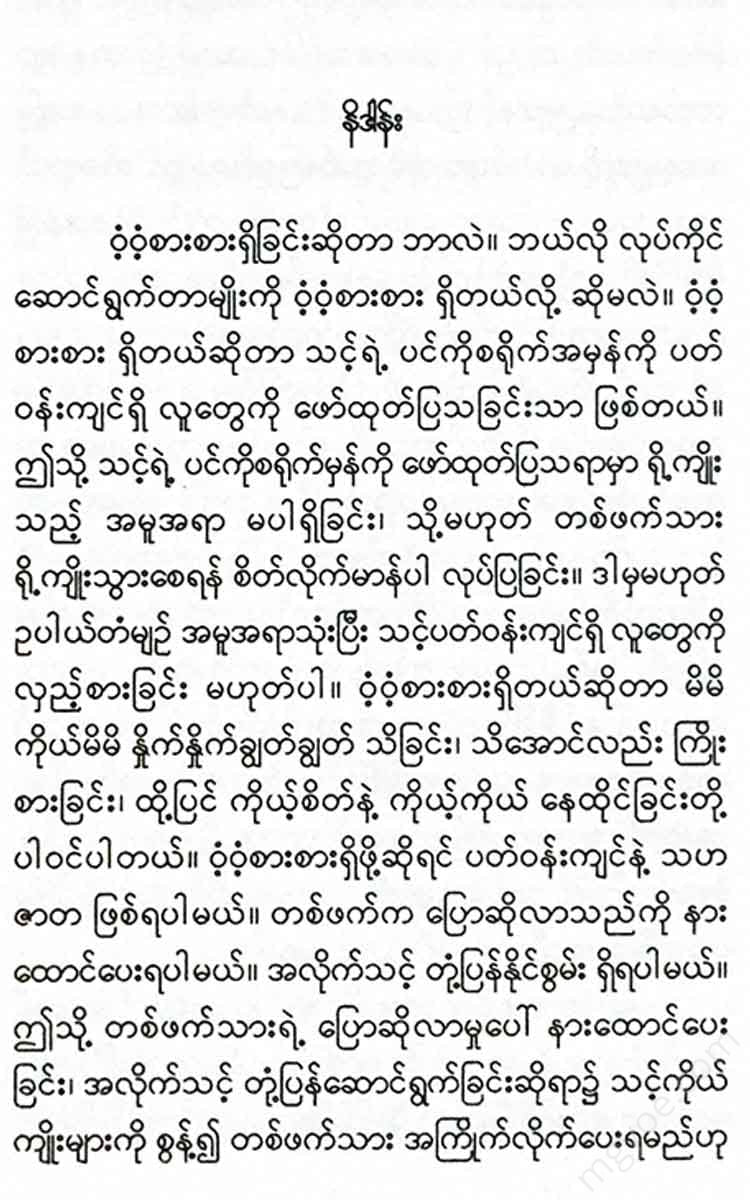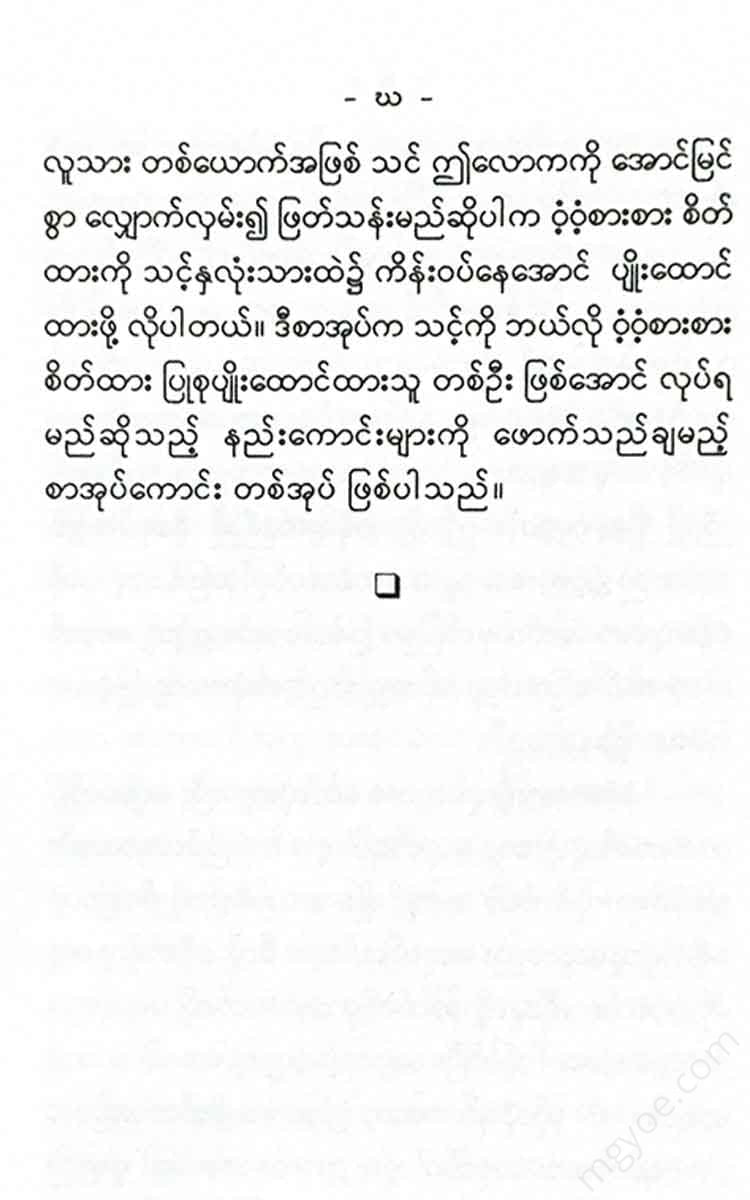စိတ်ကူးချိုချိုစာပေ
Maung Cho (Psychology) - Becoming a Brave and Great Human Being
Maung Cho (Psychology) - Becoming a Brave and Great Human Being
Couldn't load pickup availability
When you enter this world and become a six-month-old baby, you have two habits. The first is to be gentle with everything you do and not react to anything. The second is to react to things that are not acceptable. When you get a little older, you start shaking your head. You start to show signs of being uncomfortable. You start to react to things that are uncomfortable. From the moment you start to differentiate between these two, you become a special human being, unlike anyone else in this world.
When you first start walking, you do whatever you want to do. When you are strong, you do it. You learn to do whatever you want to do freely. You don't feel guilty about saying no if it doesn't suit your desires. You don't see it as a sin. You don't act hostile. You just have to be brave enough to say no and become a great human being. Saying no is a natural action. Saying no is a natural human action that comes naturally when you see something you don't like or don't like. Who is scolding you for saying no every day? You are no longer a child, so you have the right to say no to what you don't like. Saying no is not rude. It is not impolite.
You may wonder how many people will think of you for refusing something you have to refuse. However, no matter how many people think or feel, you should refuse and refuse boldly.
From childhood, people are shaped by the world around them. People, time, and external influences shape them every day. Should a person be liked by the people around them? Should he boldly express his desires? Should he not do anything boldly because of the time? Should he suppress his ideas, desires, and opinions because of the influence of the region? Should he not respond to issues that he should respond appropriately because of external influences? Should he act according to the popular mood and the time?
A person has the ability to distinguish between good and bad. He already knows what he should do and what he should not do. A small child is too young to distinguish between good and bad, but he shows signs of liking when someone gives him attention, smiles, and laughs. What will this child do if he does not get the things he likes, such as attention, affection, and laughter? He will show his displeasure in some way. He will scream. A child will also have a negative attitude. If he does not like something, he will react in a negative way. This is human nature. These attitudes have been in place since childhood. When a person grows up, he is no longer allowed to act in a negative way. Sometimes, he follows the wishes of the environment and fulfills the needs of the environment without considering his own benefit.
You have to choose whether to be brave or not. To succeed in the world, you have to do what you have to do. You need to know that being brave is an act led by intelligence. There is no difference between being brave and being bold. Being brave is related to courage. Being bold is related to wisdom. There are times when you have to be brave. You have to speak and act boldly, and you have experienced and will experience these moments many times in your life. One thing you have to accept is that “being bold” is something you have to learn, it is not something you are born with. No one is born with the courage to speak, say, or do. You gradually develop the courage to speak, say, and do things. Depending on your attitude, you and the people around you can adjust and interact with each other so that you and the people around you can be comfortable with each other.
You and those around you are being molded by life. And so you have to dance from your role on the stage of life. You and other human beings have kept the teachings of the environment in mind and have acted in accordance with the environment. If you are a good woman, you should never get angry, and you should not cry in public, these are all molded. If you are a man, you should not be a tiger, you should not be violent, you should not play football, you should not fight, these are all molded. Some of you have been molded more than you should. Fortunately, your behavior and speech are not fixed because of being molded. They can change depending on the time, place and environment. Character, genes, etc. are rarely lost or changed.
Humans are growing in intelligence and knowledge over time. What is right becomes wrong, what is wrong becomes true, what is not becomes false. As people's knowledge and understanding improve, their ideas and concepts also change with the changes and cessations.
So, the childhood impressions gradually decrease, other new impressions come in, and attitudes, behaviors, and speech change. There are exceptions, and some impressions become ingrained.
You have to choose the right one.
One thing to know in advance is that the attitude of being gentle in everything you do and the attitude of being bold in everything you do are both good and bad. The attitude of being gentle in everything you do, being calm, and not talking can be said to be a good attitude depending on the time and place. On the other hand, it does not mean that every time you say something, you say something, you go somewhere, or come somewhere, it is good. The main thing is that you should consider the people around you, the time and place, and the factors (motivating factors) that are influencing you to decide what kind of attitude you should have. It is true that you should respond to injustice with courage. It cannot be said that being bold is always good. To get a rough idea of when and in what situations you should speak up, try the exercise below.
* You must choose one (1) of the three (3) answers provided. You do not need to provide your own answer. Once you have marked your preferred answer, move on to the next one. There are three (3) questions. After you have completed all of them, there are comments below the questions. Compare your answers.
1. You have a strict no-race policy at work. If you learn that one of your subordinates is joking with a colleague of a different race using language that could lead to racial conflict,
- "I've already told you not to make jokes that are racially offensive. It's a work rule that you can't make jokes or be rude. If you don't follow it, you will be taken action."
- "It's just a joke. If you guys can't stand it, I'll be scolded by the top."
- "I've already said it, if a problem arises from a racially offensive joke, the person who caused it will be fired."
2. A salesperson under you comes to you with a complaint. You call the salesperson and say, “I know that’s what you called me about. I was wrong, sir. I was wrong. The person at home also didn’t miss the doctor’s appointment. The illness got worse between the doctor and the appointment.”
(A) “Leave your household chores at home, don’t drag them into your work. Your work feeds you. That’s why your work wants the best service from you. It doesn’t want your excuses.”
(B) “Oh.. Hey, is your husband feeling better now? Tell me what I should do. Please continue to check with the social services.”
(c) “Well.. I understand. Tell me, is there something wrong with you? Is it okay with you? Anyway, it would be best if there were no problems at work.”
3. One of your subordinates made a mistake. You didn't know it, but your boss heard about it. He came into your office and said, "The office is full of useless people. You don't know anything, do you? So what's the point of being a supervisor?"
(A) “Yes, sir, yes, sir, it won’t happen again, sir, I promise. It won’t happen again.”
(b) "I don't drink despite what the dogs say. I'll hold on tight, sir."
(C) “It seems like it happened by accident while I was taking care of it, sir. It’s not a big deal. It’s not important enough for me to know. As far as I know, when has this ever happened in my department?”
1. (A) What you said is effective (there is a lot of courage), but since you have already told the employees to avoid it, you should have said it more strongly because it is a joke and a joke.
(B) The tone is too soft, not the kind of tone that will survive no matter what. At the same time, it is also obvious that the management is poor. (Seems like they can't control the rules) They apologize to people, and they don't talk about the rules and regulations of the business first.
(C) It's short and simple. It's a tough one. A little anger would be fine in this kind of situation. "The person who causes trouble will be fired" is the most effective warning. The tone is more important than the content: "You have to be fired."
2. (a) You are too arrogant. Your manner of speaking is bold. But there are no words that represent compassion or consideration. It is not appropriate to speak like this in this situation.
(b) There is a soft spot. It is true that there is currently a lenience towards the other party. But there is no courage to speak out about guilt.
(c) He could have expressed sympathy or boldly said, "It would be best if there were no problems at work."
3. (a) A tendency to be selfish in everything they do, not judging what is right or wrong. Not taking responsibility or accountability. Only blindly admitting guilt, completely lacking in courage.
(b) There is a lot of anger. But this kind of talk is not about boldly analyzing a topic.
(c) Is the response courageous and can the workers defend themselves by citing their previous record of innocence?
The main point is
1. No one is born with the ability to speak and act boldly. Life shapes them to a greater or lesser degree.
2. It is in this context that we must cultivate ourselves to have the courage to speak, to say, to do, and to have the courage to act.

















